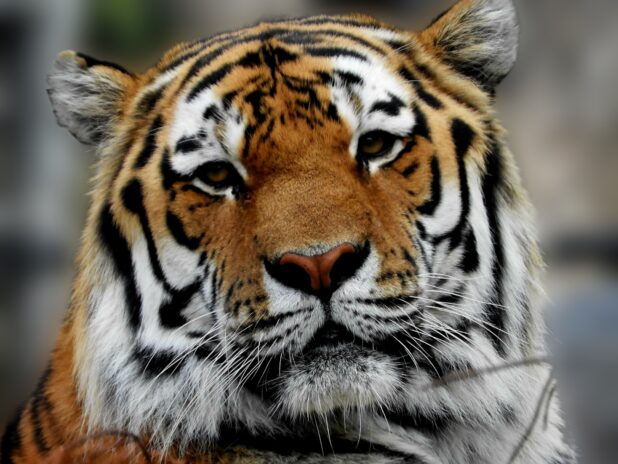Headline News
Call for provincial regulation of exotic animals growing louder
June 26, 2024

By Alejandra Cervantes
In a world increasingly attuned to the rights and welfare of all living creatures, the issue of exotic animal protection has become a focal point for advocates and lawmakers alike. Recently, a significant campaign led by World Animal Protection and the Association of Municipalities of Ontario has garnered attention. This campaign aims to address the pressing need for provincial regulations on the possession, breeding, and use of non-native, or “exotic” wild animals in Ontario. The resolution put forth by this coalition not only highlights the inherent dangers and ethical concerns of keeping such animals in captivity but also calls for a standardized approach to their regulation across the province.
Ontario is home to a surprising number of private non-native wild animal keepers, roadside zoos, mobile zoos, wildlife exhibits, and other captive wildlife operations. The province surpasses all others in Canada in this regard. These operations often operate in a regulatory grey area, leading to inconsistent standards of animal care and public safety. Unlike other provinces that have developed robust regulations, Ontario’s lack of comprehensive legislation in this domain is increasingly seen as a significant oversight.
The keeping of non-native wild animals poses considerable risks to human health and safety. There have been several instances of attacks causing injury and even death within the province. These incidents underline the potential danger these animals can pose when not properly managed. Exotic animals, by their very nature, have unpredictable behaviors and specialized needs that are difficult to meet outside their natural habitats. This unpredictability, coupled with inadequate containment measures, can lead to tragic consequences.
Beyond the risks to human safety, the welfare of the animals themselves is a major concern. Non-native wild animals often suffer in captivity due to improper care, insufficient space, and lack of stimulation. These conditions can lead to severe physical and psychological distress. The exotic pet trade and roadside zoos frequently prioritize profit over the well-being of animals, resulting in environments that are far from the natural habitats these animals are adapted to. The lack of regulation means there are no enforceable standards to ensure these animals are treated humanely.
The introduction and keeping of exotic animals also pose risks to local ecosystems. Escape or release of these animals can lead to invasive species problems, which can disrupt local wildlife and plant life. These disruptions can have cascading effects on biodiversity and ecosystem health, further emphasizing the need for strict regulations.
Municipalities across Ontario have been grappling with the challenges posed by exotic animal ownership. These challenges are not just limited to enforcement but extend to regulatory, administrative, and financial burdens. Local governments often find themselves ill-equipped to handle the complexities of exotic animal issues, leading to prolonged struggles and inconsistent outcomes. The lack of provincial standards exacerbates these issues, as municipalities are left to develop their own regulations, resulting in a patchwork of bylaws that vary widely in their effectiveness.
Recognizing these multifaceted challenges, the Association of Municipalities of Ontario, the Association of Municipal Managers, Clerks and Treasurers of Ontario, and the Municipal Law Enforcement Officers’ Association have thrown their support behind World Animal Protection’s campaign. In letters to the Ontario Solicitor General and the Ontario Minister for Natural Resources and Forestry, these organizations have emphasized the urgent need for provincial regulations. Their unified voice underscores the broad consensus among municipal leaders about the importance of addressing this issue at a provincial level.
The Town of Bancroft has been a pioneer in this regard, having implemented an exotic animal bylaw as far back as 2014. This bylaw has served as a model for other municipalities and highlights the benefits of proactive regulation. The recent resolution passed by Bancroft in support of the provincial campaign is a significant step forward. The resolution calls on the provincial government to implement regulations that restrict the possession, breeding, and use of non-native wild animals and to license zoos. It advocates for a fair and consistent application of policy throughout Ontario to ensure the safety of both the public and the exotic animal population.
The resolution also calls for broad support from other municipalities across Ontario. By forwarding the resolution to all municipalities, Bancroft aims to galvanize a province-wide movement. The endorsement of this resolution by multiple municipalities would send a strong message to the provincial government about the collective will to address this issue. The ultimate goal is to establish comprehensive regulations that protect both human and animal welfare, create a uniform standard across the province, and ensure that Ontario is no longer a haven for unregulated exotic animal ownership.
The campaign led by World Animal Protection and the Association of Municipalities of Ontario represents a critical step toward safeguarding both exotic animals and the communities in which they are kept. The proposed provincial regulations would provide much-needed clarity and consistency, addressing the significant health, safety, and welfare concerns associated with the keeping of non-native wild animals. As municipalities like Bancroft lead the charge, the hope is that Ontario will soon implement comprehensive regulations that reflect a modern and humane approach to exotic animal protection.


















